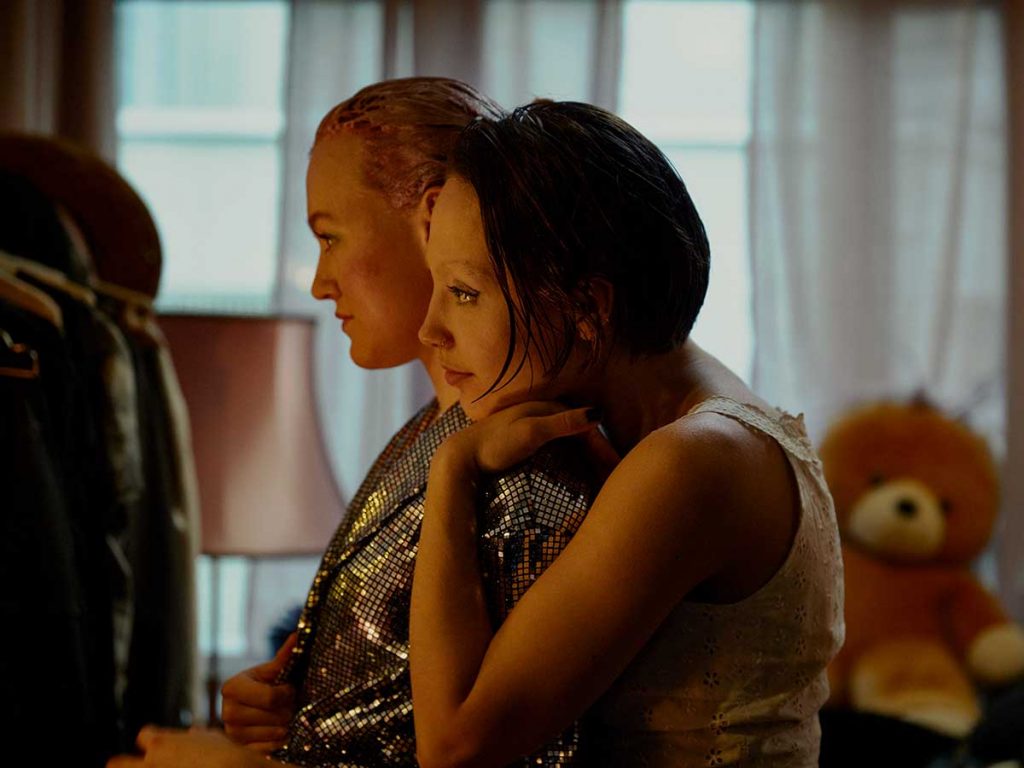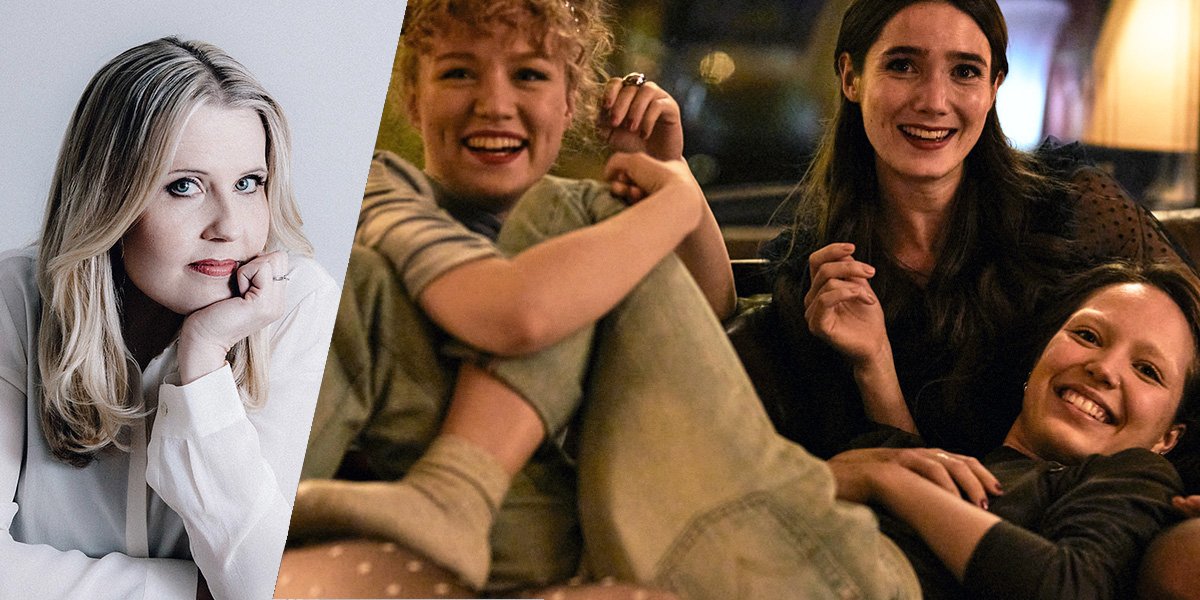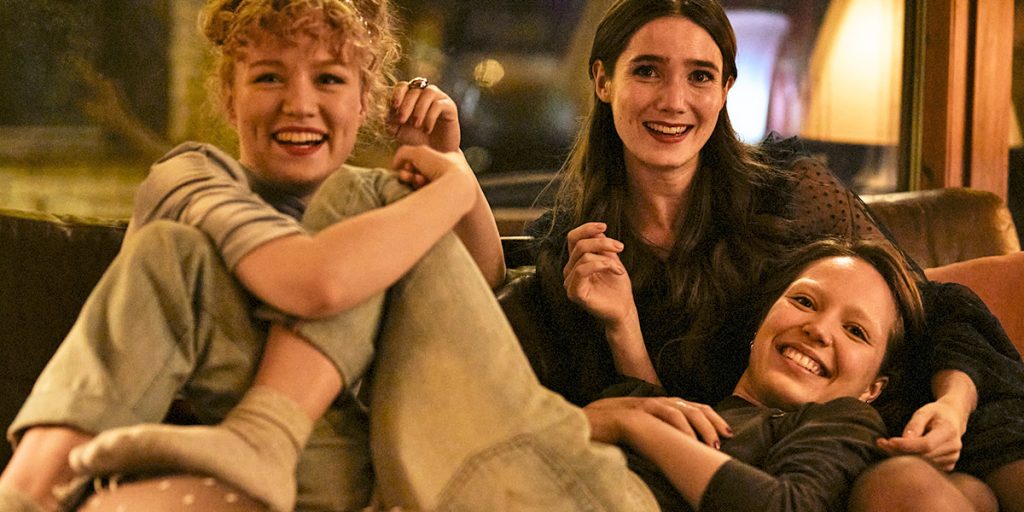Young love flourishes in Alli Haapasalo’s charming Girls Girls Girls, a coming-of-age drama with a compelling narrative and strong emotional heft.
The title alone is indicative of the film ’s rapturous celebration of girl and womanhood. Tytöt tytöt tytöt (Girls Girls Girls) is plastered across the screen at the start in creative, colourful font, setting the tone for what follows: a euphoric trip with three teenage girls on the cusp of womanhood discovering themselves and the world around them, complete with all the inevitable hiccups along the way. Girls Girls Girls leans into some standard coming-of-age drama tropes – montages with upbeat music, friendships experiencing troubling moments, drunken teenage nights out – but still manages to stand above most other films from this subgenre, finding an enormous emotional resonance within its striking and well-structured plot. Girls Girls Girls might only take place across three weeks (specifically three Fridays and one final Saturday), but for these teenagers, it may well be the most crucial period of their lives.
The three girls in question are Emma, Mimmi and Rönkkö, the latter two best friends from school who spend their weekends going (reluctantly) to parties and (seemingly less reluctantly) working at a smoothie bar. The focussed Emma – also a student at their school – spends her spare time ice skating, concentrating on this endeavour with militaristic rigidity in order to qualify for the European Championships. Emma and Mimmi’s romance, which begins with a coy and wonderfully awkward meet cute across the smoothie bar counter, parallels alongside Rönkkö’s own journey of discovery, as she struggles to find sexual pleasure with a boy. The friendship of Mimmi and Rönkkö in Girls Girls Girls forms the female-driven foundation, but refreshingly many of their discoveries and experimentations take place independently. Director Alli Haapasalo (Love and Fury, Force of Habit) handles the above with such care and intelligence, creating a drama that is exquisitely realised and striking in how fully formed it feels.
Haapasalo’s treatment translates directly into the other elements of Girls Girls Girls too. From the warm compositions, thoughtful lighting and colourful production design, there is a cosy, personal tone throughout the film, right down to Ilona Ahti and Daniela Hakulinen’s screenplay. Their script is full of wonderfully relatable teenage moments – whether it’s singing uninhibited with a friend or dragging your heels at a weekend job – but more importantly, it handles its characters’ sexual orientations with a graceful understanding.

In addition, Girls Girls Girls doesn’t contain any threats or abuse towards the three girls; it feels like an important step in creating LGBTQIA+ cinema that doesn’t fall back on these sorts of storylines, which are undoubtedly important narratives to bring to screen but shouldn’t become the one constant. It is refreshing to see Emma and Mimmi’s relationship blossom unhindered and Rönkkö’s possible asexuality – she is constantly unsure if she will find kissing or sex with males pleasurable – explored with such acceptance and empathetic depth.
Emma, Mimmi and Rönkkö – played by Linnea Leino, Aamu Milonoff and Eleonoora Kauhanen respectively – are all well-rounded, genuinely likeable characters too, complete with realistic flaws. All three actors bring a raw authenticity and charming playfulness to Girls Girls Girls; Leino and Milonoff both transform their characters from pent-up balls of stress and pain into teenagers who loosen up and smile, thanks to the transformative, giddy medicine of first love. Kauhanen gives Rönkkö an intelligent complexity, which is necessary for a character who is slightly different from the other two teenagers because she is still unsure and confused about her sexual orientation. The chemistry between the girls – Mimmi forges strong relationships with both Emma and Rönkkö but the latter two have little screentime together – is also utterly fabulous, their exchanges an engaging blend of quick-witted banter and fresh emotional vulnerability. Just like their characters, these three actors are as dynamic on their own as they are with each other; Girls Girls Girls finds consistent celebration in both female friendship and independence.
Girls Girls Girls might play out too formulaically in its earlier stages, but this matters little when it morphs into something so powerful and unique. The emotional ecstasy finale does complete justice to what has come before it, and further ensures that Girls Girls Girls rises above other coming-of-age dramas that focus on teenage girls. When the words Tytöt tytöt tytöt flash up on screen again and the credits roll amidst a flashing background of intense and bright colours, the brief but wonderful journey Emma, Mimmi and Rönkkö’s lingers. This is unrestrained cinema riding high on a celebratory cloud of female freedom, full of the jubilant discoveries and inevitable difficulties that arise in your teenage years.
Girls Girls Girls had its UK Premiere at the 2022 BFI Flare on 16 March, and opened at the IFC Center (NY) on August 12. The film will be released in UK cinemas on September 30, 2022. Read our interview with director Alli Haapasalo.

 loudandclearreviews.com
loudandclearreviews.com
